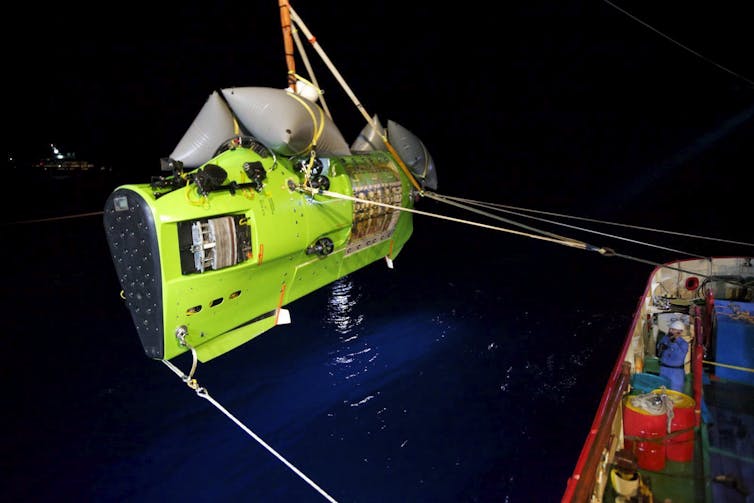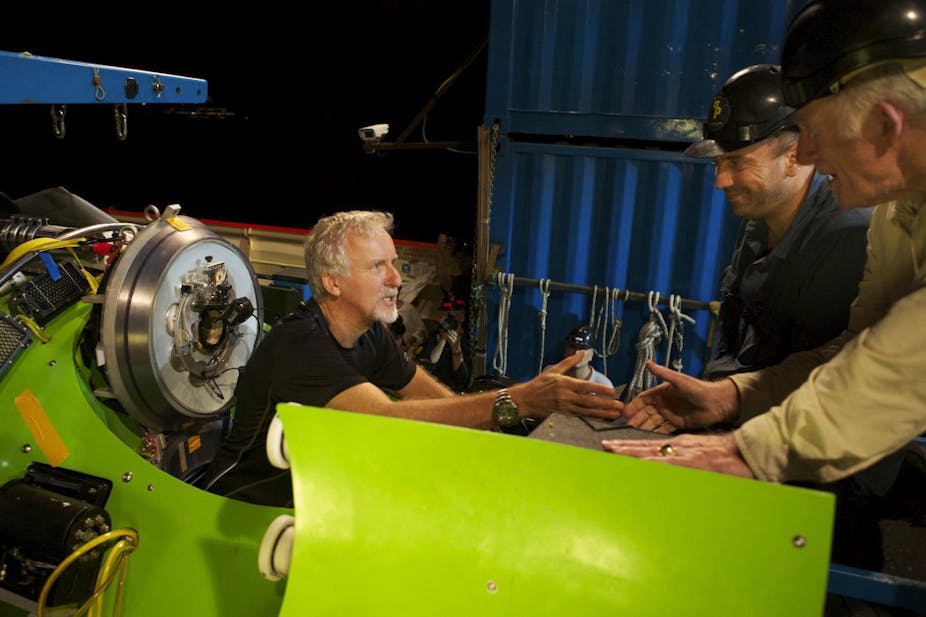Today as I ate lunch, Titanic, Terminator and Avatar director James Cameron was at the bottom of the Mariana Trench, the deepest point in the ocean. We know this for a couple of reasons. Not only did he and his team build an amazing submarine for travelling to the deepest deep – they also included the ability for him to tweet while down there.
And so it was that 132 characters of English came worming their way up through the abyss:

I have to admit, this made me feel quite emotional. This is unusual these days: this is exploring.
There’s something truly amazing in our ability to wrap ourselves in ever more wonderful exoskeletons, exoskins and exoorgans, to use cloth and bone and wood and wire - and now steel and glass and aluminium and an array of elaborate hardware - to take our bodies into environments we never evolved to survive in.
There is something wonderful in using our abilities to journey across frozen mountains, arid deserts and hostile seas to see what’s there and to survive. We are not creatures designed for the deepest ocean, yet we have figured out a way to survive there.
Cameron’s submarine – the Deepsea Challenger - is a wonder of modern engineering. Secretly built over the last eight years in Australia by the company Acheron Projects, the Deepsea Challenger has steel walls more than 6cm thick, required to withstand pressures 1,000 times stronger than at the surface.
Where other deep-sea boats have been horizontally arranged, Cameron’s is oriented vertically for optimum plunging. Its thrusters have been placed at the highest point to minimise turbulence and turbidity at the viewing level. The sub even spins like a bullet on its vertical axis to hold a straighter line of descent.
While some criticised Cameron’s dive as an exercise in ego-stroking, the director-turned-explorer spent much of his time on the sea bottom collecting sediment samples and small sea creatures, to be analysed by NASA scientists.

Yet while I gape in slack-jawed wonder at Cameron’s voyage, I know that exploring is something fraught, riddled not just with the quest to know and learn and understand, but to take and claim and conquer. I want to shout for joy at his exploring, but I know that the word itself is damaged: of all the great crimes we have perpetrated against each other, unthinking exploration has been up there with the worst.
This is obvious in people such as Clive of India and Hernan Cortes, who saw exploring and conquest as synonymous. Clive, of course, was not “of” India. He landed, mapped, conquered and stole. Cortes’s destruction of the world of the Aztecs has been described as one of the bloodiest events of human history.
Yet the criticism of exploration must also be levelled at more outwardly peaceable map-makers such as James Cook and Douglas Mawson. Yes, they have little of the blood of the conquistadors on their hands, yet as explorers they played critical roles in dividing and defining the world as we know it today.
Cook and Mawson both saw themselves not just as describers of the world, but as writing the world, planting the flag for King and Country in distant lands. Indeed, scientific exploration as a quest to describe the world cannot be considered politically neutral.
Like a social science version of Heisenberg’s Uncertainty Principle (where either a particle’s position or momentum can be known, but not both) knowledge of the world has always given mapmakers a greater role in defining what that world is.
And so we’ve (I’ve) grown up with an internalised conflict: between the hyper-masculine explorer - who just went out and bloody did stuff - and the recognition that this archetype is a positive danger to everyone else around him.
As an individual I long to go and do, free from the fetters of social responsibility; as an individual I want those fetters of social responsibility to make a better world for all.
This tension cannot resolved in or by Cameron’s voyage. He hasn’t sought conquest of the deepest deep and no humans will die for his vision. His is not the criminal exploration of centuries past. Yet questions will be asked.
Couldn’t this money have been better spent elsewhere? Aren’t you polluting a pristine environment? Are you doing this for science, or for individual glory?
Some of us might be able to answer these questions easily, but I don’t know if I can. I don’t have yes or no answers.
So what is the emotion I felt when I read Cameron’s tweet? Was it wonder at our abilities as humans to transcend our normal biological limits? Or was it that combination of respect and jealousy one feels for the man with far greater agency and opportunity than I, who has done what I wish I could do?
Should I want to travel to the unseen places of our planet too, or should this want be repressed? Should I want to bear that title, explorer?
I don’t know. I know that our world is almost relentlessly unfair, uneven, unjust. Some of us will have opportunities like James Cameron, most of us won’t.
In his great work Being and Time Martin Heidegger argued that angst was the mood that most revealed us as human. I’m feeling this now: as humans we are defined by our capacity to explore and by our capacity to recognise the others around us; by our yearn for individual glory, and by our desire to live socially with others.
We see angst here. This is a tension we can’t, I’m afraid, resolve.

